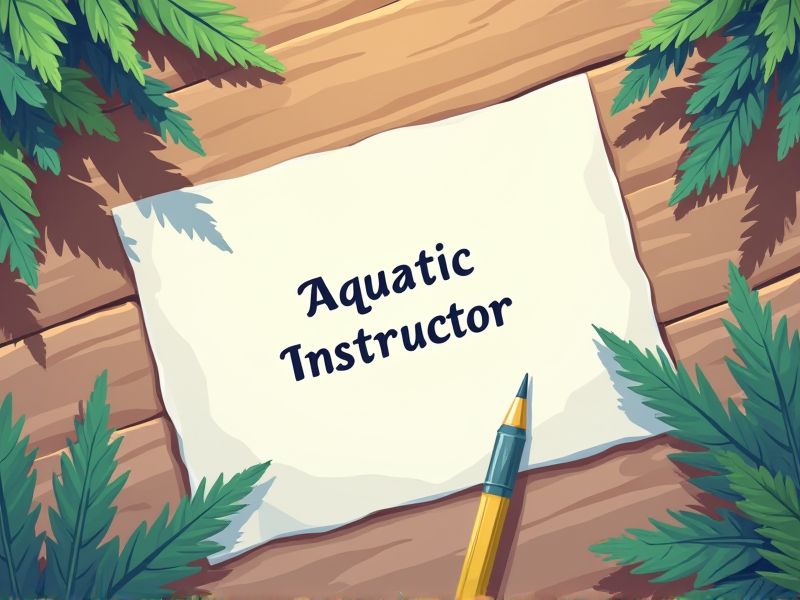
Aquatic instructors play a crucial role in ensuring safety and effective learning in water environments. Certifications are necessary because they validate an instructor's skills in water safety, teaching techniques, and emergency response. Regulations mandate these certifications to mitigate risks and enhance instructional quality. Important certifications you may need for an Aquatic Instructor include CPR, lifeguard training, and water safety instructor certifications.
American Red Cross Water Safety Instructor Certification
The American Red Cross Water Safety Instructor Certification ensures instructors possess comprehensive knowledge of water safety protocols and best practices. Achieving this certification indicates the instructor has been trained to deliver effective swimming lessons and preventative safety measures for various age groups and skill levels. This certification serves as a standard of reliability, ensuring instructors are equipped to handle emergencies and promote a safe aquatic environment. Without this certification, instructors might lack the necessary skills and recognition needed to ensure the aquatic safety of participants.
YMCA Aquatic Instructor Certification
The YMCA Aquatic Instructor Certification ensures that instructors are equipped with the necessary skills to teach swimming and water safety effectively. This certification provides standardized training that helps maintain consistent teaching quality across different locations. Certified instructors ensure the safety of participants by being knowledgeable about rescue techniques and emergency procedures. Many employers prefer or require this certification, making it a valuable credential for those seeking employment in aquatic instruction.
American Red Cross Lifeguard Certification
The American Red Cross Lifeguard Certification ensures that aquatic instructors possess the essential life-saving skills and knowledge required for emergencies. Given the high-risk nature of aquatic environments, this certification equips instructors with the expertise to assess and manage potential hazards. The certification includes training in CPR, first aid, and rescue techniques, crucial for preventing drowning incidents. Many employers require this certification to guarantee a standardized level of competence and safety in aquatic facilities.
CPR/AED Certification (Professional Rescuer)
Aquatic instructors often work in environments where drowning risks are elevated, making CPR/AED certification crucial to respond effectively to emergencies. This certification equips instructors with the skills necessary to provide immediate life-saving measures, potentially increasing survival rates in critical water-related incidents. Many organizations mandate CPR/AED certification as part of their safety protocols, ensuring compliance with industry standards and legal requirements. Trained instructors also contribute to a safer environment, enhancing confidence among participants and promoting a culture of safety within aquatic programs.
First Aid Certification
First aid certification equips aquatic instructors with the necessary skills to respond effectively to emergencies, reducing the risk of harm to individuals in aquatic settings. Instructors with first aid training can quickly assess situations and provide immediate care, potentially preventing fatalities in critical situations. The presence of a certified instructor instills confidence in participants and promotes a safe learning environment. Certification ensures instructors are up-to-date with the latest life-saving techniques, adhering to industry standards and regulations.
Aquatic Facility Operations Certification
Aquatic Facility Operations Certification is needed for an aquatic instructor because it ensures they understand facility maintenance and water quality management, which directly impacts swimmer safety. This certification provides the instructor with knowledge of safety regulations and emergency response procedures, reducing the risk of accidents during aquatic activities. A certified instructor can optimize the facility's resources, ensuring efficient operation and cost-effectiveness. Holding this certification enhances the instructor's credibility, making them more attractive to potential employers and clients.
Pediatric Advanced Life Support (PALS)
Aquatic instructors who are trained in Pediatric Advanced Life Support (PALS) can effectively respond to emergencies involving children, significantly increasing the chances of survival and recovery. Pool environments, particularly those frequented by children, present a high risk for drowning and other aquatic-related injuries, necessitating the ability to perform timely and efficient lifesaving measures. Enhanced understanding of child-specific medical assessments and interventions enables instructors to provide targeted care, tailored to the unique physiological needs of children. This critical training supports instructors in making quick, informed decisions that adhere to the latest guidelines, improving safety outcomes in aquatic settings.
Open Water Lifeguard Instructor Certification
An Open Water Lifeguard Instructor Certification is essential for an Aquatic Instructor as it ensures they possess the specialized skills to handle emergencies specific to open water environments. Aquatic programs often occur in diverse settings, and the certification provides the necessary knowledge to manage risks associated with tides, currents, and marine life. This certification also guarantees that the instructor can teach others how to respond effectively in situations unique to open bodies of water. A certified instructor enhances the safety and confidence of participants, increasing the likelihood of successful and enjoyable aquatic activities.
Pool Operator Certification
Pool Operator Certification is necessary for an Aquatic Instructor because it ensures they understand water chemistry, crucial for maintaining a safe swimming environment. This certification equips instructors with the skills to identify and address potential health hazards, preventing waterborne illnesses. It enhances the instructor's capability to manage pool equipment effectively, reducing equipment failure risks. Acquiring this certification often leads to increased trust from clients and employers, promoting professional credibility.
Bloodborne Pathogens Training Certification
Aquatic instructors are at an increased risk of exposure to bloodborne pathogens due to the likelihood of dealing with injuries in water sports. Proper training in handling bloodborne pathogens ensures instructors can implement safety protocols effectively, reducing the risk of transmission. Certification demonstrates the instructor's knowledge in maintaining a safe environment for both themselves and participants. Regulations often mandate such training to comply with health and safety standards in aquatic facilities.
Summary
By obtaining additional certifications, you can enhance your credibility and attract more clients seeking specialized aquatic instruction. The certifications provide you with advanced skills and knowledge, improving the quality of your teaching and potentially increasing student satisfaction. Competence in diverse areas may also lead to career advancement opportunities, including higher pay or leadership positions. Equipped with recognized credentials, you are better positioned to meet industry standards and expand your professional network.
